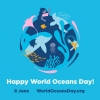Scientific Diver discovered an unknown reef in the Arabian/Persian Gulf
Science 10.12.2014Researchers at the TU Bergakademie Freiberg have discovered a living coral reef spanning 28 square kilometres off the coast of Iraq. Researchers made the discovery of the unknown reef in the Arabian/Persian Gulf at the mouth of the Shatt Al-Arab River (Euphrates and Tigris) by coincidence while on a scientific diving expedition. It was previously considered unlikely that coral would be able to colonise in the extreme conditions of this maritime region.
Even though coral ecosystems are widely distributed in the coastal regions of most of the Persian Gulf countries (Bahrain, Iran, Kuwait, Oman, Qatar, Saudi Arabia and in the United Arab Emirates), there was no previous knowledge of the existence of coral reefs in the merely 58 kilometres long coast of Iraq. “Because of the turbidity of the coastal waters from the confluence of the Euphrates and Tigris Rivers, it was not possible to detect the presence of the coral reefs by means of satellite observations,” explains Hydrogeology Prof. Broder Merkel, head of the CMAS Scientific Diving Center (GERS00) and vice-rector for research at the Bergakademie. In 2012 and 2013, the team of researchers from the Freiberg CMAS Scientific Diving Center had been on the move for study purposes in Iraq’s coastal waters with colleagues from the Iraqi University of Basrah. It was then by chance that the researchers came upon the tropical coral reef which extends over an area of four times seven kilometres and which they have been inspecting during a number of diving expeditions.
“The discovery was sensational for all of us,” says Prof. Hermann Ehrlich, Heisenberg-Professor of Biomineralogy und Extreme Biomimetics, “because tropical coral reefs are an extremely sensitive ecosystem. They normally grow in clear bodies of water where temperatures rarely drop below 20°C. Here, however, seawater temperatures fluctuate between 14 and 34 degrees Celsius.” The study area is said to be characterised by a high level of turbidity, strong tidal currents as well as large temperature and salinity variations during the course of the year. First examinations of the corals already showed relevant differences from other reefs in the region: Four of the coral taxa (groups) identified are classified as belonging to the particularly slow-growing species which are massive and robust enough to grow and survive in the harsh environmental conditions.
Further investigations are planned in spring and fall of this year in order to arrive at a better understanding of the coral ecosystems under the specific climate-related and environmental conditions. According to the researchers, with respect to global climate change, this would provide valuable insights into how marine ecosystems adapt to extreme conditions. In view of the extensive oil and gas exploration in the Gulf region, for now the reef is in urgent need of protection, scientists observe in their study report.
More information is available at: www.nature.com/srep/2014/140306/srep04250/full/srep04250.html



























